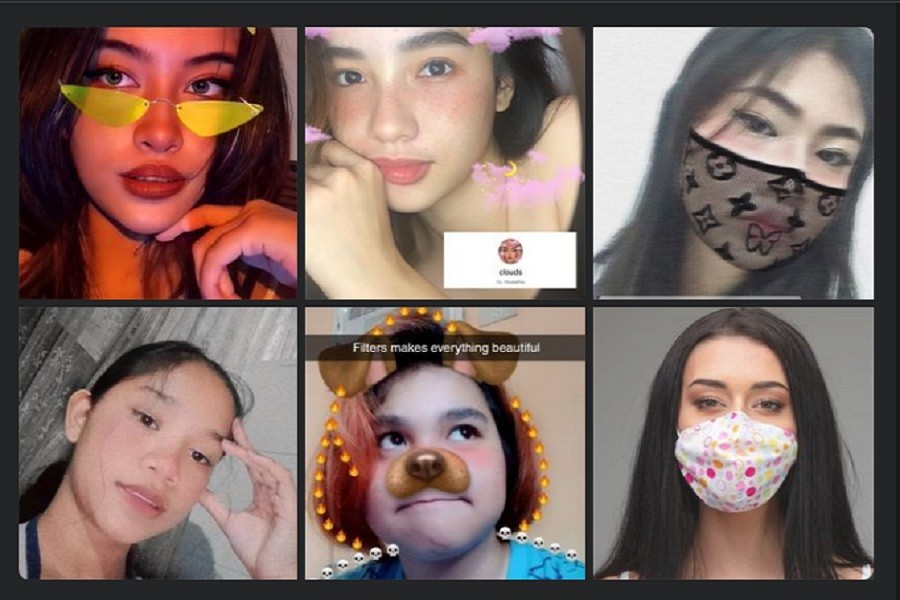“Just a little touch-up, contouring, fuller lips, jawline as sharp as a knife and I am good to go.”- the reason you are likely to do this is to hear your notification bell ringing with constant ‘you look gorgeous,’ ‘absolutely stunning,’ ‘perfection,’ etc.
Social media have become an indispensable part of our life, especially during the pandemic. With an approximate 70 per cent increase in usage during the pandemic, we can surely acknowledge the impact of social media in our daily lives. Our actions and thoughts are being shaped by the influencers and/or the mass population.
That’s where filter swoops in by introducing numerous ways to hide our so-called flaws and bring out a whole new different person. The fun of structuring your own face online has turned into such an obsession that people start to question their beauty. That’s where it creates an unrealistic desire in us to make our faces ‘selfie ready’ and more photogenic. When this thought isn’t turned into reality, we tend to grow less fond of our features and hence insecurity arrives.
This author conducted a survey with open-ended and multiple-choice questions in this regard. The participants were mostly aged from 17 to 25. To understand the impact of face filters, it is necessary to know the reason behind the usage.

Survey result
Surprisingly (or is it?), users tend to be more diverted towards using filters to achieve glass skin like models or influencers. However, are the influencers transparent about their looks? It is to mention that 10 per cent of photos posted with #nofilter actually use an Instagram filter?
Raya Tabassum, a Bangladeshi first-year student at New York University, told this writer, “I feel more beautiful with filters, but when I post photos on social media without filters, that makes me feel more confident about myself.”
Again, Jannatul Umme Marjahan, a student at Holy Cross College, gave a somewhat similar statement to Raya’s as she said, “I feel confident without filters but using filters makes me feel beautiful, and at the same time insecure.”
Jannatul mentioned an important fact - insecurity. It is more of an issue regarding short term and long term impact. In the survey, 52.5 per cent of participants feel more confident and/or beautiful with filters, whereas 47.5 per cent feel more confident and/or beautiful without filters.
This interest in using filters works as a process.

To get real-life responses from the viewers, this author intensively edited her own picture (nose sharpening, eye bags removal, jawline sharpening, etc.) using B612. She then made a collage side by side with the original picture and put it out for a vote.
Out of 60 votes, 40 per cent preferred her alien-like edited picture where 60 per cent preferred her original picture. Such unrealistic edited face being liked by 40 per cent is even a reason to be concerned about. However, the number of respondents in the survey was 60 to 70.
The participants also mentioned having used several makeup products but one common thing was BB cream, a cosmetic product used to even out facial skin tone covering flaws.
However, most participants complained that the heavy texture of the cream is unsettling on the face. In this exact survey, 35 per cent of the respondents agreed that their interest in using filters is fueled by other people. So, it has turned into a general thought that, to incorporate ourselves with societal standards, our imperfections need to stay hidden to feel more accepted and beautiful.
This obsession towards ‘flawless facial features’ has become so wanted that in 2018, researchers found out that 55 per cent of surgeons deal with patients wanting to change their appearance for selfies (up from 42 per cent in 2015).
Another important finding was that filtered images trigger body dysmorphia. Body dysmorphic disorder (BDD) is a mental health condition where a person spends a lot of time worrying about flaws in their appearance. Filtered images aren’t the only reason for causing BDD; however, it contributes to triggering this disorder. With all the arguments made, it is clear that face filters put an impact on our mental health.

Impact of face filters on our mental health
However, preaching self-love at this point in social life is very important. AmrinTasnimJaima, a digital content creator, pointed out an important issue that one doesn't have to be perfect according to beauty standards.
“I don’t have to portray the image that I got the unrealistic beauty standards. And to me, not using filters is how I boost my self-confidence, to be honest.”
Even if we cannot reduce the usage of filters, we must be able to differentiate between filtered and original pictures. Robert Welsh, a UK-based makeup artist, also makes videos pointing out even the slightest edits and filters in selfies or face videos. This truly helps people to understand which is reality and which is distorted. But this choice is totally on the users, whether they wish to stay in the loop of ‘societal acceptance’ or if they want more ‘personal acceptance.’


